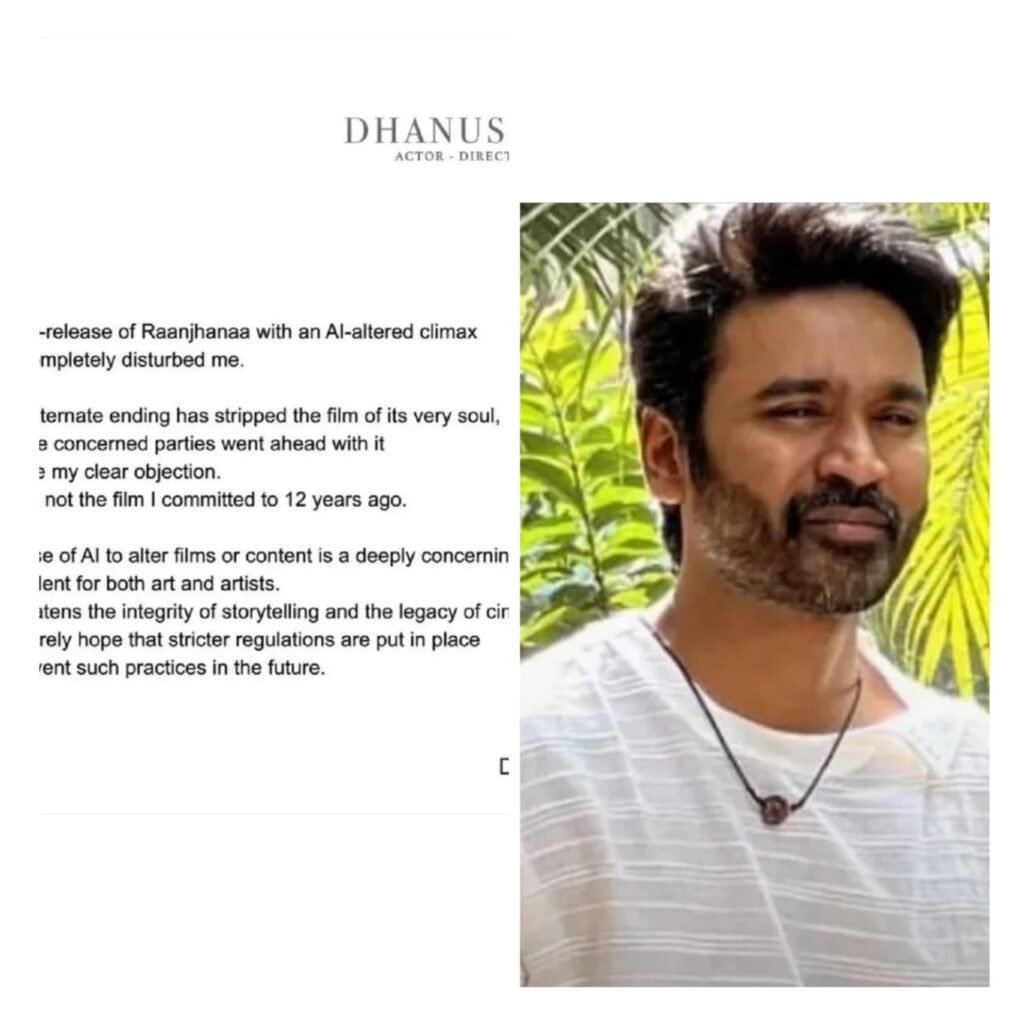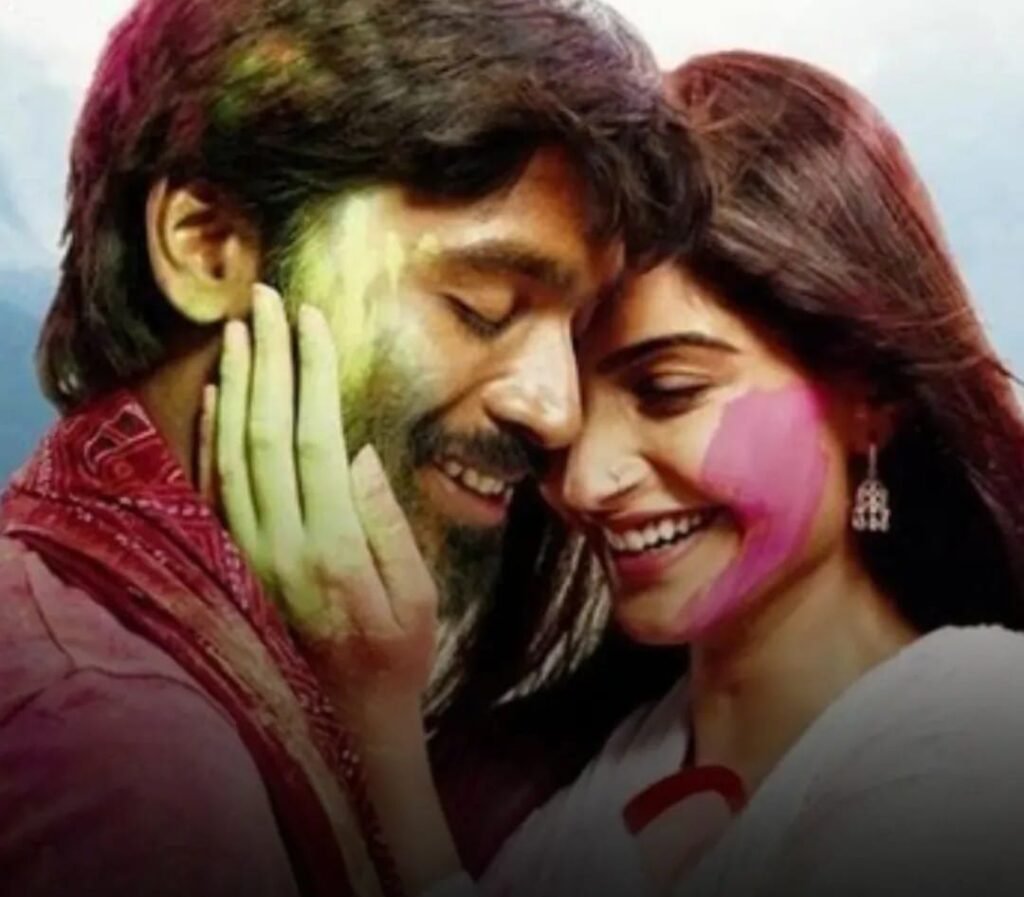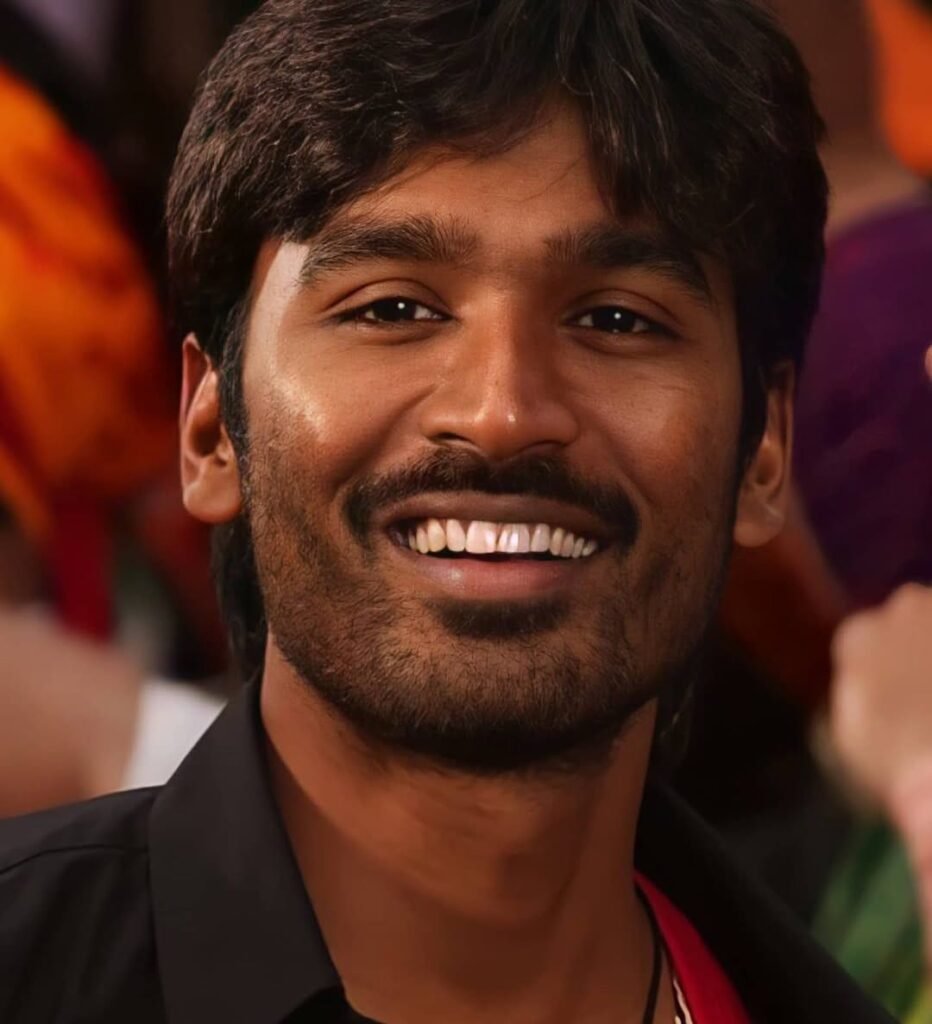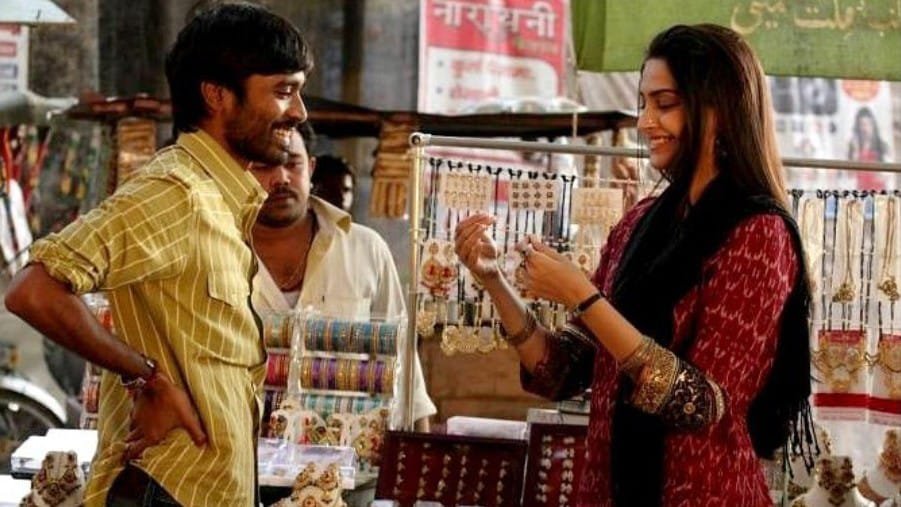Dhanush slams the AI-altered re-release of Raanjhanaa, calling it a betrayal of the film’s soul. Discover what really happened, why fans are outraged, and what this means for the future of Indian cinema.
With every industry being gradually infiltrated by AI, the cinematic circles in India have found themselves in the throes of controversy with the recent untimely resurrection of the romantic tragedy Raanjhanaa. On the 1st of August, 2025, classic theaters of greater Tamil Nadu had the honor of screening the Ambikapathy:
New Age Classic, but with a catch- there was an old motif:
An AI-generated alternate ending irrevocably alters the infamous climax. This piqued not just nostalgia but rage as well. Actor Dhanush, who played the soulful Kundan at the heart of all this chaos, publicly condemned the altered version, which fanned off into a nationwide discussion on the ethical considerations of AI in filmmaking.

What Was Raanjhanaa About?
Recap of the 2013 Classic
Indeed, one of those rare Indian romantic dramas that touch one’s soul, Raanjhanaa was directed by Aanand L. Rai and written by Himanshu Sharma. It follows the story of Kundan (Dhanush), a young man from Benaras steeped in religious practice, hopelessly in love with Zoya (Sonam Kapoor), a girl from a different world—both culturally and emotionally.
The original climax scarred the audience heartwrenchingly: the protagonist Kundan, sacrifices himself, choosing death over living with the agony of betrayal and loss. That was not only a rollercoaster of tears, but it is a masterstroke that carved itself into cinematic history.

The AI Tweaked Re-Release: What Changed?
The Happy Ending Nobody Wanted
Fast forward to the year 2025, when theaters in Tamil Nadu cranked the film out as Ambikapathy in an entirely different way. Thanks to AI, in this one, Kundan actually survives the stab, wakes up in a hospital, and rejoins his friends. A happy ending came with the erasure of the tragedy. Ergo, the life got sucked out of the film.
Dhanush Breaks Silence: “My Objection Was Ignored”

The Actor’s Public Statement
The National Award-winning actor was far from amused and took the matter to social media and formal press channels to express his discontent.
“I was not consulted, nor did I approve of any changes to the original film. The altered version completely misrepresents Kundan’s character and undermines the story’s essence. Despite my clear objection, concerned parties went ahead with the release,” says Dhanush.
A ceremony it did not become-it was a blatant standoff. And it wasn’t just about creative control; it was about the integrity of storytelling.
Why This AI Move is Becoming a Bigger Debate
Al-altered happy ending of Raanjhanaa. pic.twitter.com/1C954pEoTH
— The Cinéprism (@TheCineprism) August 1, 2025
When Does One Draw a Line With AI in Cinema?
All things considered, AI affords infinite potential in Visual Effects, dubbing, and script development, but the post-editing of history in itself subsequently imposes a whole new set of issues.
Ethical Concerns:
Is it fair that one manipulates an artist’s work after its release without the artist’s consent in the first place?
Is it disrespectful to inform the cast and crew about an alternate ending?
Audience Manipulation:
Long-time fans were shaken awake.
An emotional weight was rightfully taken away from Kundan’s sacrifice turned into a mere plot device.
Legal Implications:
The nation stands in a legal vacuum at present, finding no concrete laws pertaining to AI-related post-production alteration of copyrighted content.
FFI has been reported to demand urgent deliberations.
Stat Alert: In a Filmfare AI and Creativity Survey, 68% of the filmmakers in India felt that AI should only be allowed to work in technical domains, never deciding matters of creativity such as plot rewrites.
Expert Opinions from Bollywood
Sonam Kapoor and Aanand L. Rai Speak Up
Sonam Kapoor, playing the role of Zoya, concurred with Dhanush’s comments.
“Kundan’s death is what gave the film its emotional core. A change there takes away everything it stood for.”
Aanand L. Rai expressed shock and disappointment at the re-edit and added that no one had sought his approval for the same.
Industry Voices
Veteran filmmaker Anurag Kashyap wrote on Twitter:
“Filmmakers are not algorithms. You don’t plug in a new ending because it ‘trends better.’ You honor the original soul of the story.”
Film critic Anupama Chopra said in a YouTube discussion:
“Raanjhanaa was never about a happy ending—it was about emotional truth. Altering that is like Photoshopping the Mona Lisa with a smile.”
The Real-World Impact: Why This Matters for Indian Cinema
This incident keeps setting a bad precedent. If AI-based versions become mainstream, we actually risk:
Dilution of artistic integrityHurting actor-director collaboration, encouraging rewrites just for fan service instead of meaningful storytelling
Case Study: Similar Incidents Around the Globe
Star Wars AI Fan Edits: Disney had to crack down on AI-generated “happy” edits of The Last Jedi.
AI-fan versions instituted alternate endings in relation to the “Oldboy”-sponsored copyright litigations.
There might be many such matters, but that in Ambikapathy might be the first due to its unclearly drawn line.
What Can Be Done Moving Forward?
Suggested Action-Points
Legal Machinery: With modification for AI, certain amendments relating to Copyrights will have a forum for discussion.
Consent Norms: Any post-release alteration shall require the written consent of the original creators.
Transparency for Permissive Viewing: The altered version will include a disclaimer being announced at the opening credits.
Ethics Board: An Ethics Board shall be constituted under the aegis of CBFC, which shall decide on whether an AI-aided re-release is feasible.
Lights, Camera, and a Pause on AI Tampering
Beyond an artistic dispute, Raanjhanaa controversy stands as a cultural landmark for how, with the changing mode of content creation via AI, the Indian film industry would progress, in spirit, supporting artistic intent, consent, and respect for original works. The wrath of Dhanush is not for one film alone; it is to set a precedent.
FAQs
1: Why did Dhanush oppose the AI alteration of the ending of Raanjhanaa?
Dhanush objected because the AI-modified ending undermines the original message of sacrifice and was done without his consent.
2: What AI-generated change was made in Ambikapathy?
The original tragic ending of Kundan dying was replaced with a “happy ending” where he lives and wakes up in a hospital.
3: Who approved of the AI edition?
Reports remain silent on who approved such a change, but it is certain that Dhanush and Aanand L. Rai, the director, were definitely not involved.
4: Is it legal to alter film endings by AI in India?
The question about using it in India is somewhat ambiguous since there is no rule specifically banning it; however, industry bodies are pushing advancement of legislation of this kind.
5: Will the new version be stopped from being shown in theaters?
The pressure is mounting, but still no move has yet been made.
6: How do fans feel about the change?
Large numbers of fans poured out their outrage on social media, calling the change “unnecessary” and “disrespectful.”
